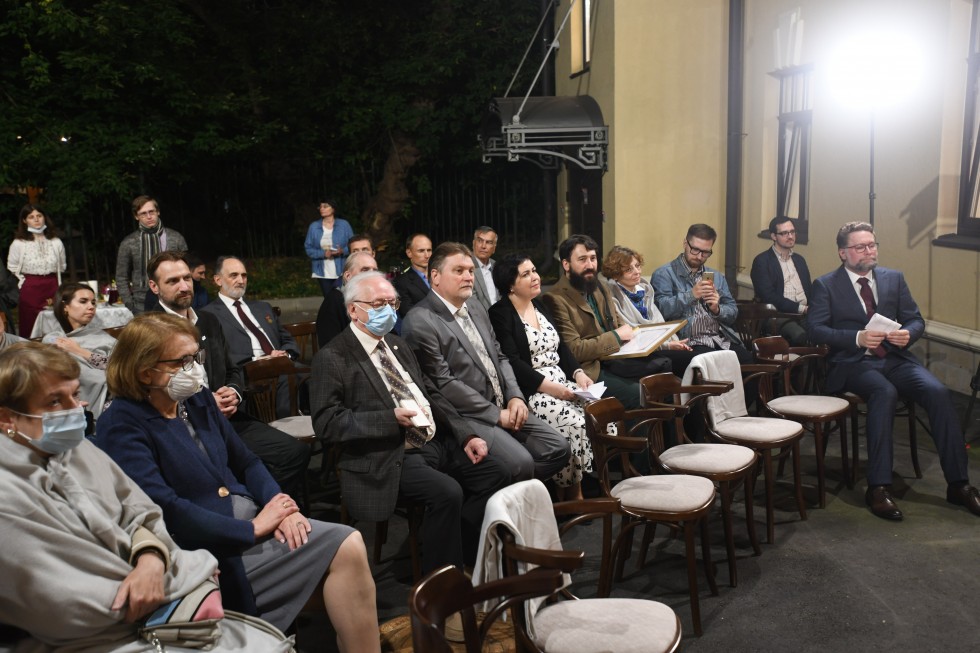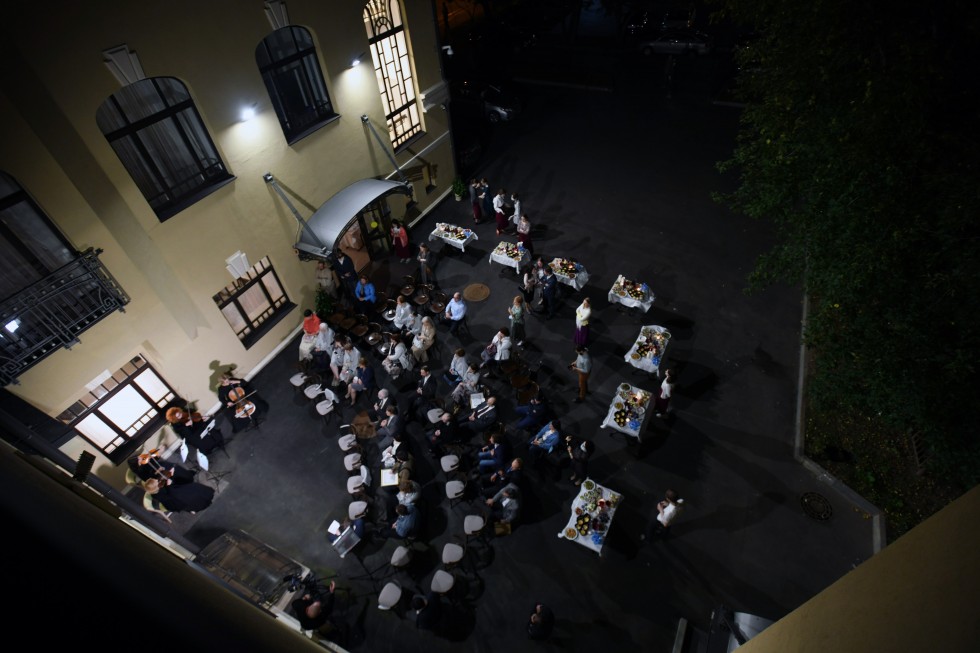Angels Helped to Build this House
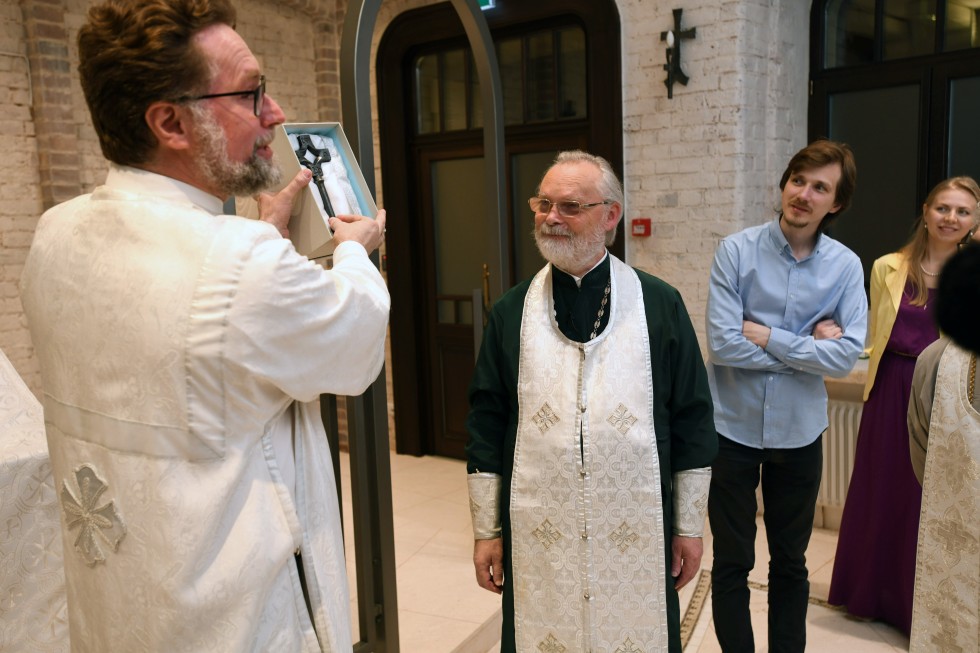
First Vice Rector of SFI, Dmitry Gasak, gives SFI founder Fr. Georgy Kochetkov a present in memory of the grand opening of the new building – a symbolic key to the building
The school year at St. Philaret’s Institute opens with a long-awaited event; the opening of a new academic and administrative building at Tokmakov pereulok, in Moscow. The building, with the blessing of Patriarch Kirill, has been equipped with a house chapel dedicated to St. Philaret of Moscow.
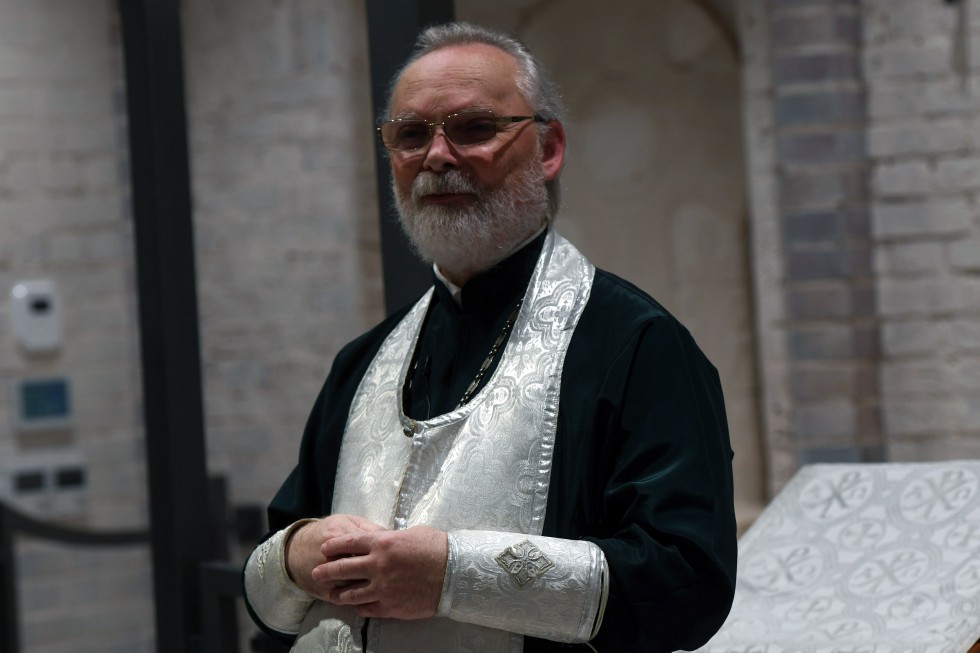
Father Georgy Kochetkov
Father Georgy Kochetkov, Founder of SFI: What exactly is St. Philaret’s Institute? Who does this building belong to? St. Philaret’s Institute arose from a small, unofficial “house” university. In those days you couldn’t even speak of theological universities – even hinting at such a think by telephone was strictly impossible. There are people here who remember those times, and I’m very, very glad of it. There are people who began to prepare for what we see today back in 1975, and then in 1988 – even before the 1000th anniversary of the Baptism of Rus – there are those here who helped me found this university. There was plenty of “perestroika” on the streets of our nation at that time, but not yet within the Church. With respect to the Church, Soviet power held out until the very end. In fact, it’s still holding on at this point. After 75 years of Soviet authority, it was sometimes hard to call the church a church, at all.
For this reason, we founded a sort of house-university. We started with collecting a library; of course, it was all entirely illegal. For a small fee, people in various ministries and agencies made photocopies of the best theological literature available for us – both pre-revolutionary and contemporary literature published abroad. And we fostered this fledging university for 13 years. And the main thing is that people came: there were people to teach and people who wanted to study.
In 1990, we were unexpectedly invited to become the Theology Faculty of the Russian Open University, and for us this was legalization of our activities. On the heels of this event, we received the Patriarch’s blessing in 1992. All of this was a bit unexpected. Alexiy II was only just beginning his term as Patriarch and he had all sorts of good plans – he thought that something would work out and he gave his blessing to us.
After a year, or two or three…of course he would no longer have given his blessing, because from 1993 everything in Russia and within the Church had started to change quite radically. By 1994, we were being chased out of Sretensky Monastery – which we had just restored – by Tikhon Shevkunov’s people. They tossed our belongings – including our library and materials from our icon workshop – out onto the street through the windows. Then by the mercy of God we acquired an apartment on Pokrovka street in Moscow – then two, then three. Suddenly we had an entire floor of the building there. Soon we rented the basement floor, which at that point was in a terrible state. That’s how we came to be at our wonderful location at Pokrovka.
We thought that we would come in under the umbrella of some sort of church structure and work for our church, while also maintaining our freedom of conscience. Later, we were forced to give up that thought because we were given to understand that the system, which had already been established at that time, was working against life. But was it really possible to lose everything we had been working toward for all those years during the time of Soviet authority? Not only we ourselves had been working, of course, but the church and all our great new martyrs and confessors of the faith – of which there are thousands – for which we can be proud before the whole world. This is the glory of the Russian people, of our nation, and of our Russian church, which is significant for the whole world! Glory to God that back then we were still in a time during which it was possible to bring together much from the inheritance of the new martyrs, form relationships with Paris, with St. Serge Institute, with Nikita Struve, Sergei Averintsev, Vladimir Bibikhin, Archimandrite Mikhail (Mudjugin) and other wonderful people of our time. And we came to exist absolutely independently, freely, and at the same time within the church but without formally reporting to any particular structure. To this very day, of course, this causes a lot of misunderstanding amongst those for whom the church is first and foremost a structure.
A bit later we added a Religious Studies faculty to our Theology faculty. This turned out to be very worth while, because Christians are not the only people interested in questions of spirituality. Then we added a History faculty, which focusses primarily on the 20th century: this period of history is still kept locked away, for all intents and purposes; it is little studied and poorly understood, and much is being done to ensure that no one will ever find out how terrible it really was. And now we have also opened a Social Work faculty: we have begun to prepare people for work with the critically ill, enabling our students to provide not only social support but support in terms of quality of life and dignity. There is nothing similar anywhere else in our country.
This building, which we are blessing today, is a great joy for us and meets a great need. And this house-church chapel really is a “home” church for us, because it has been designed not even to early Christian architectural standards, but in a fashion which prevailed before the Constantinian Era began, in a period when the church was persecuted by Roman powers and didn’t have the time for artistic fancy. Everything back then was simple, but alive. That is how we ourselves want to be: let everything be simple, but alive!
We will try to preserve our Institute in such a way that it stands firmly on its feet, develops, is Orthodox, ecclesial, free and open for everyone who wishes to know the spiritual experience of mankind more deeply.
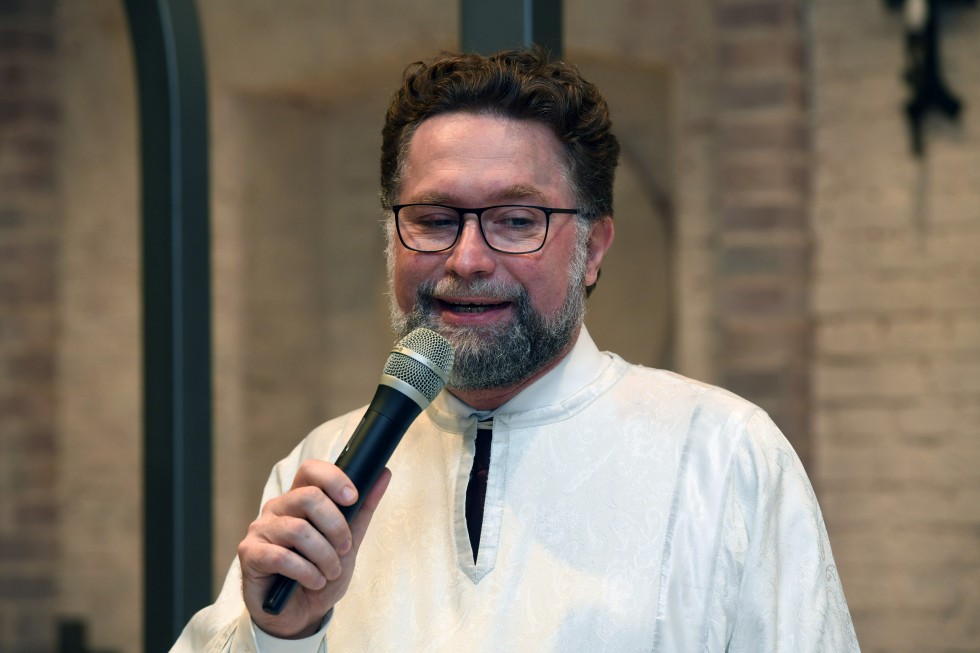
Dmitry Gasak
Dmitry Gasak, Chairman of the Transfiguration Brotherhood and First Vice Rector of SFI: As we come to the close of such an important period of our life and enter, we hope, a new phase of our journey, we would like to thank all of those who through their participation have made this possible. This house was not purchased and rebuilt on wealth, but on poverty. So many helped in the processes that I couldn’t possibly name them all today: there are thousands! Like the poor widow from the Gospel who gave her last to help many, some people gave funds, others their time and effort; they did this, as people used to say in ancient times, without pitying their lives. This building was purchased and renovated through the efforts and aid of the Transfiguration Brotherhood and friends of the Brotherhood.
First and foremost, Fr. Georgy, we would like to thank you. As founder of the Institute in 1988, you probably didn’t image that in thirty years it would grow into a small university. We heartily thank you for the spiritual bravery it took, for all your prayers, for your participation and for your attention to all the details and for the example of how we should work. And of course, for those theological and ecclesiological ideas which lie at the foundation of our Institute’s programmes, and the life of the whole Brotherhood and brotherhood as an ecclesial phenomenon in our land, in general.
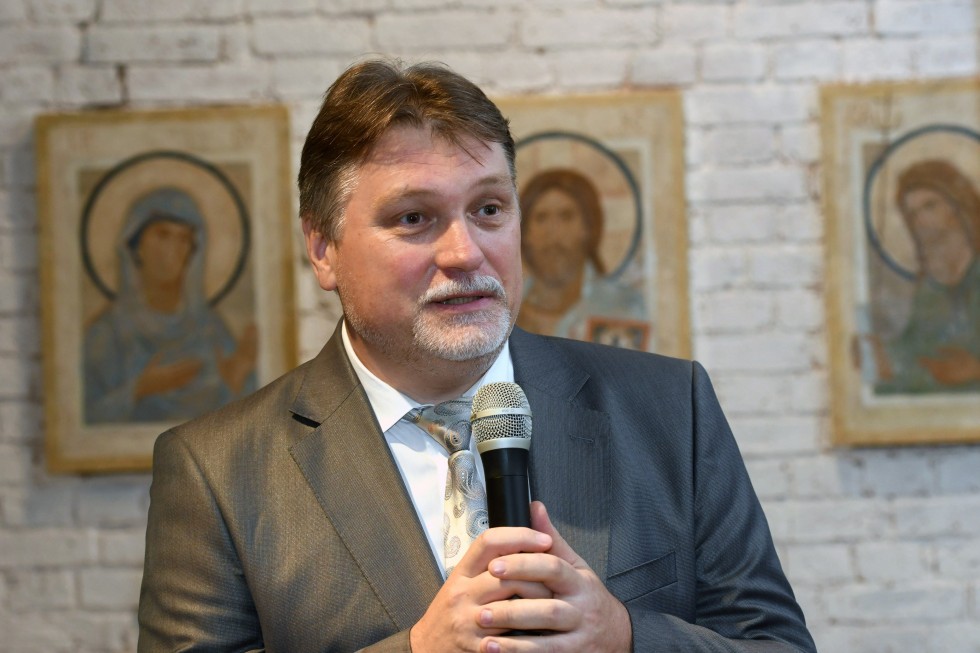
Aleksey Mazurov
Aleksey Mazurov, Rector of SFI: For us, the acquisition of this building is, of course, a new stage in the development of St. Philaret’s Institute. For several weeks I’ve been coming to this building and I’ve just wanted to pinch myself – is this a mirage or is it really happening? All of this is a little miracle, which in itself combines simplicity and beauty, elegance and thoughtful reasoning. Let’s just begin with the fact that the room for video conferences and lessons is fitted out with the latest word in state of the art technology. Over the past few months, education has changed radically as everyone has gone online, and in January 2020 I wouldn’t have believed that by autumn 2020 we would be fully functional in this format. Everything has been thought through, even up to our wonderful loft space where students can have a bite to eat and tea or coffee while they have a bit of a rest. And it’s also important that people should want to come here because they here than can rest in spirit.
Any sort of quality education lifts a person up, giving him meaning. But we know that the mission of our St. Philaret’s Institute is particularly related to life, has grown out of life and answers demands that stem from our lives. Some people who already have two degrees of higher education come to study here – sometimes we have people with PhDs completing undergraduate degrees here. What draws them here is that which gives a person self-determination and self-reliance – that pearl of great price that each person who is searching for wisdom and reason, searches for his entire life. I can’t forget the eyes of our graduating students who have defended their graduate papers and thank us for what they have received here. I want this, our 33rd academic year, to be pleasant blessing for everyone. Please pray for us and for our success, Father Georgy. The keys to this Institute as its founder, in both a direct and figurative sense, are with you.
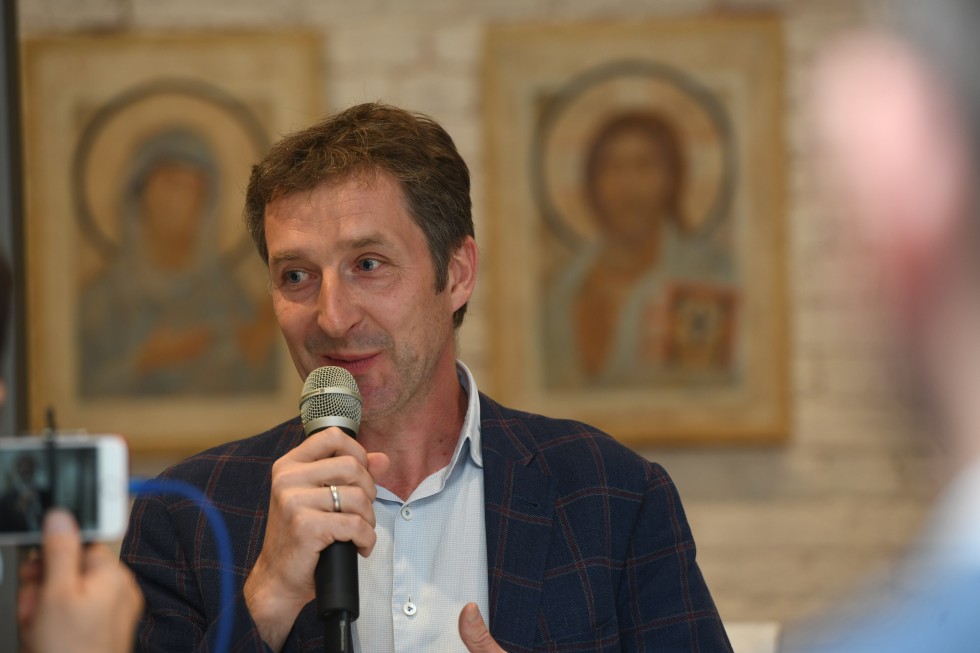
Sergei Sukorkin
Sergei Sukorkin, General Director of the Regionalnaya Finansovo-Stroitelnaya Kompaniya (Regional Finance & Construction Company): I want to witness to you that every person who worked here was doing his own work. The workers were not people from the side who came here just to earn money and then clear out, these were people who gave all the strength they had in terms of time and heart and soul. They gave all the gifts they had to give. Now we can see the result of that work before us. I know that all the Institute’s employees, teachers and administrators – and everyone who has a hand in the educational process – also give their “all” and their whole lives to this work. My elder relatives were teachers and I know that teaching is a mental affection – in a good sense of the term. We thank you for the opportunity to build this institution of learning, which will produce real enlightenment, and we thank God for the opportunity we have to come together here.
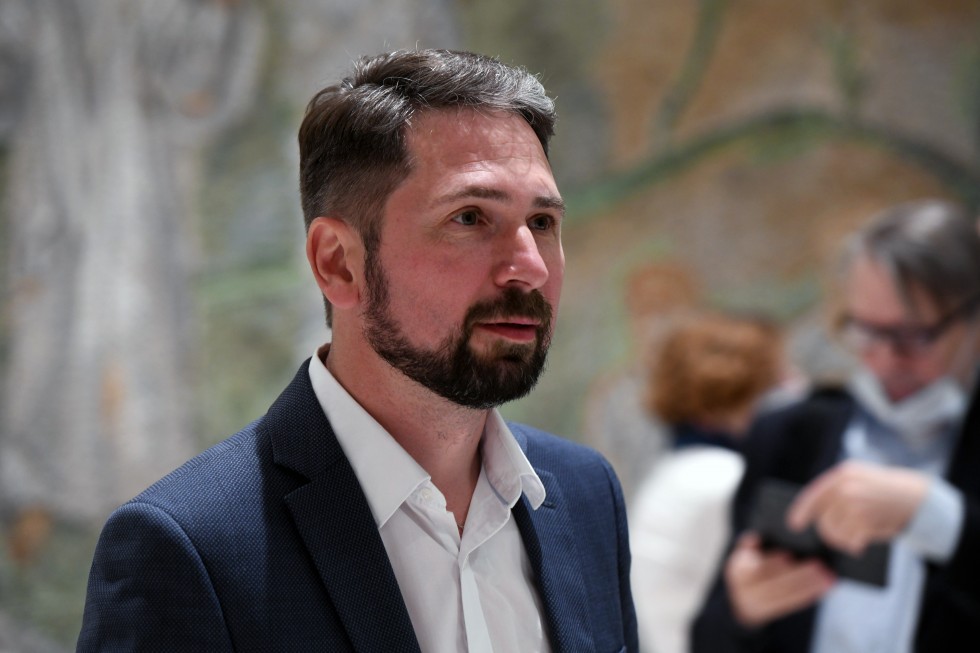
Aleksey Naumov
Aleksey Naumov, Deputy Chairman of the Transfiguration Brotherhood: I am joyful and amazed that we have successfully worked together to build not only an institution of learning, but a building, the foundation of which is our family life in brotherhood in which we are united with God. I am greatly thankful to all of those who have worked on the construction, project planning, on preparing the required documentation, etc. So very many different things were necessary. Some people’s help I, personal, felt was literally the help of angels. Sometimes I found that people have extremely angelic faces when they begin to help – this is probably the work of the Spirit. I could feel the support and prayers of many, many brothers and sisters – and it’s true that thousands of people have participated in this and are party to what has been accomplished. We ran into quite a few dead ends along the way. It is extremely difficult to build such a building in the center of Moscow and witness yet another flame of life being lit. This building brings with it new opportunities to serve God, the Russian Church, and our nation – and thanks be to God for this opportunity!
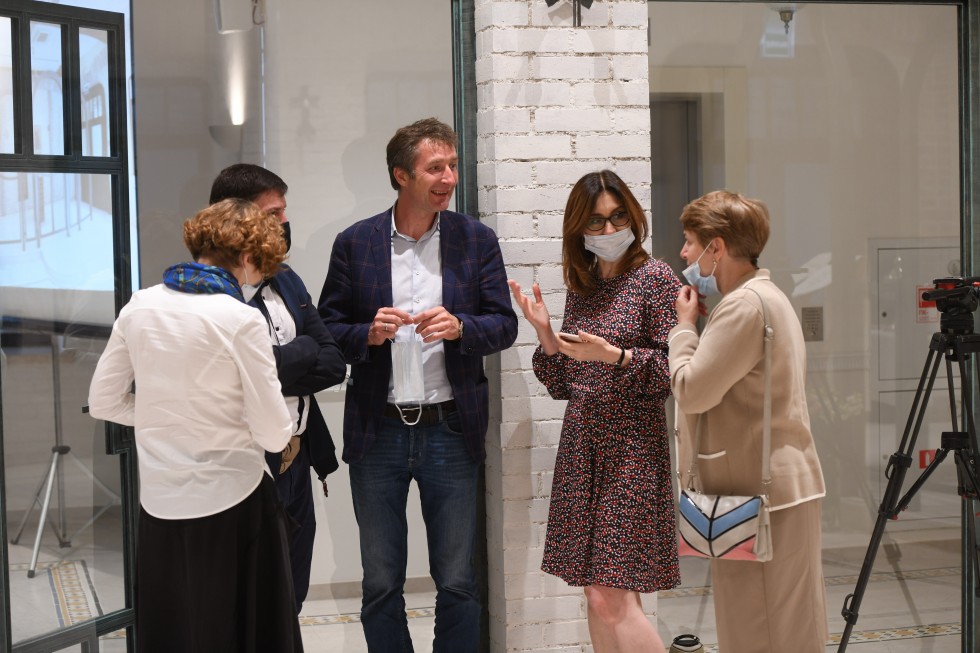
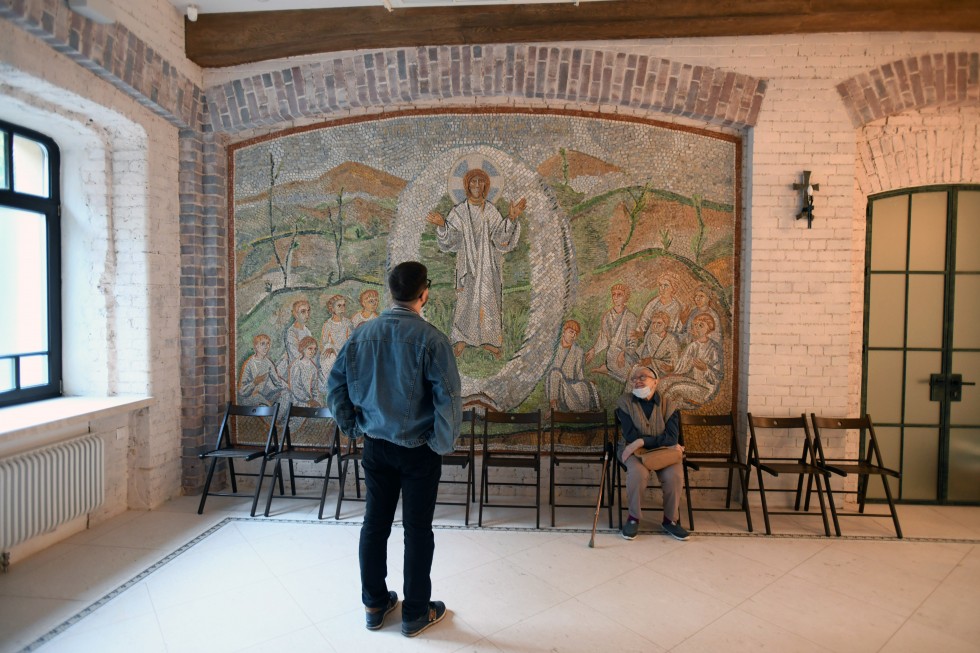
Mosaic entitled “Christ is Among Us”, by Aleksander Kornoukhov, whose workshop was responsible for works in the SFI Chapel
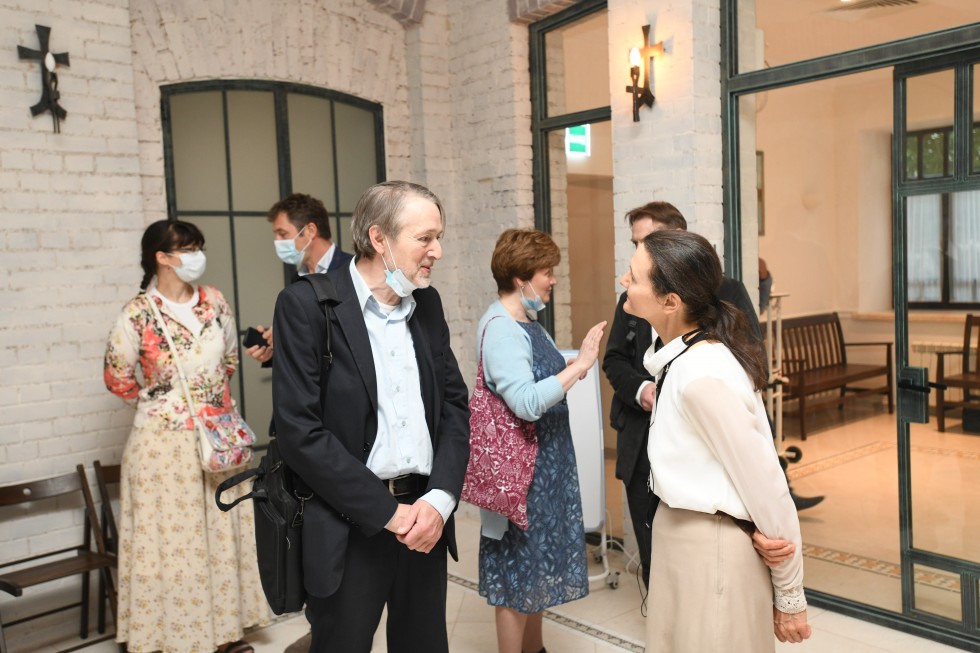
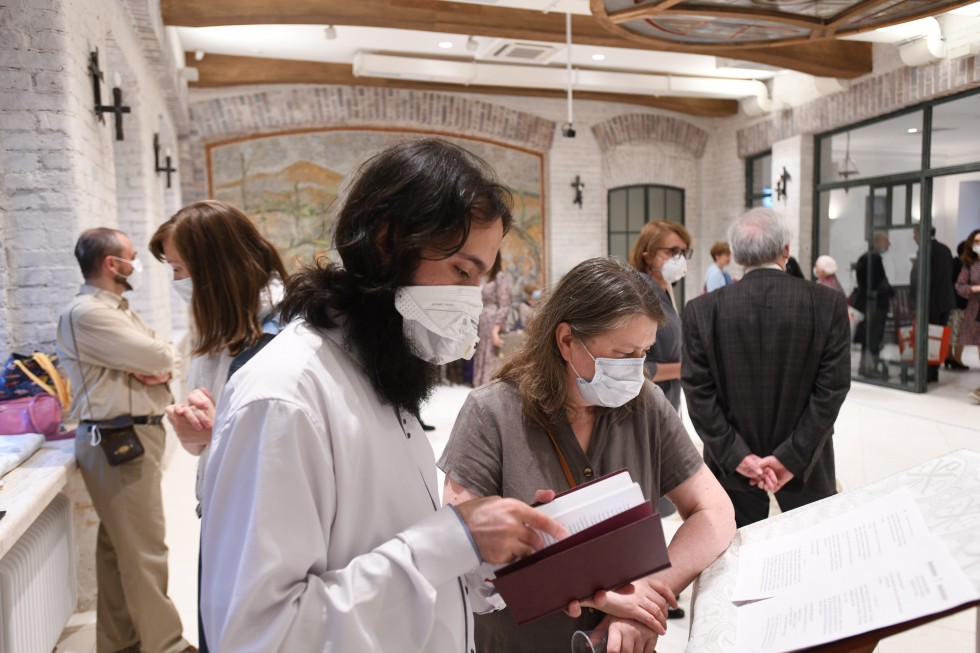
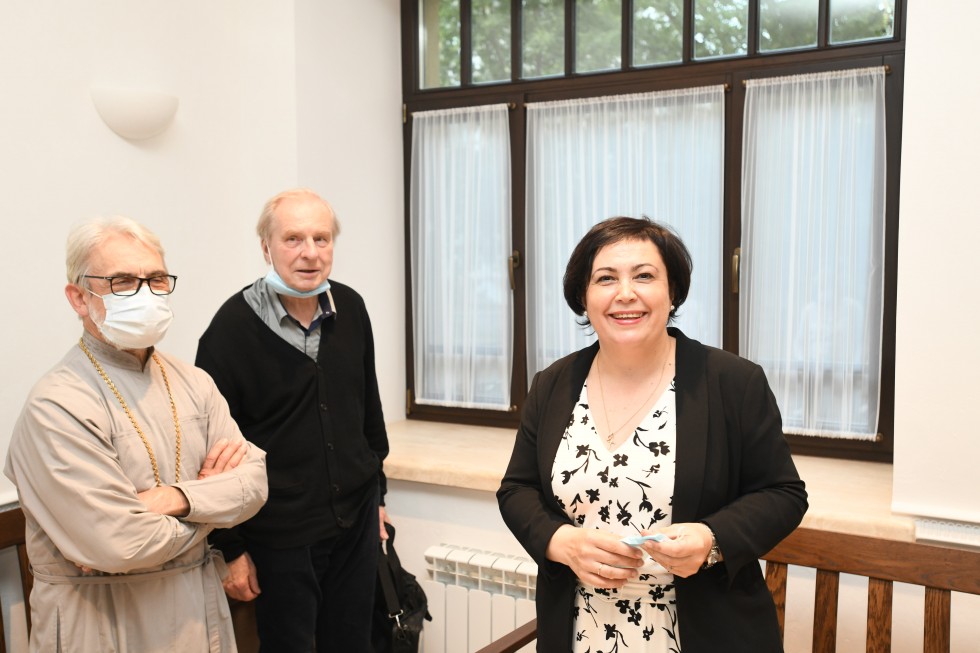
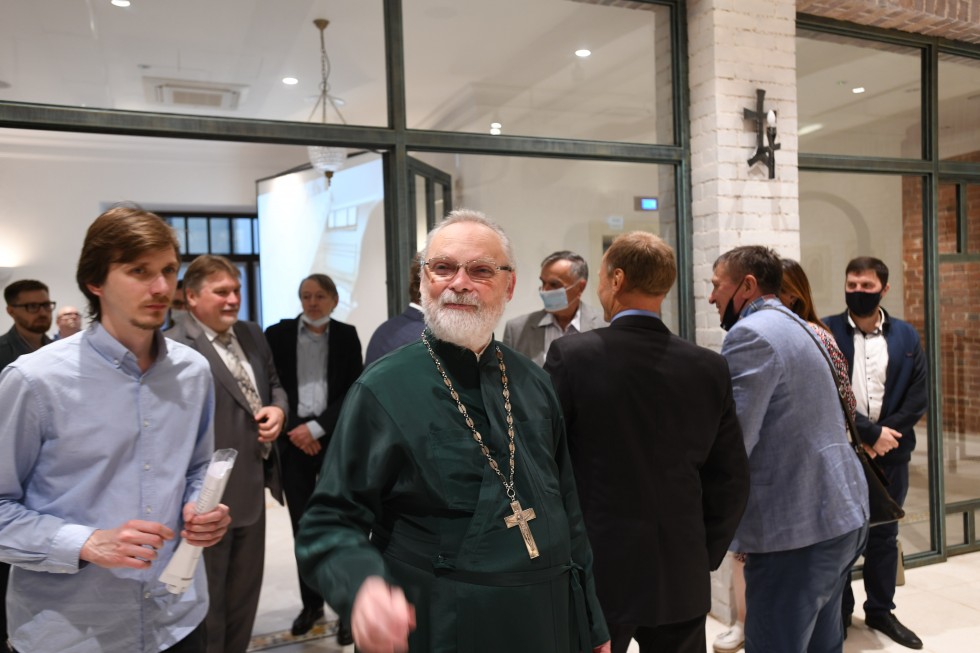
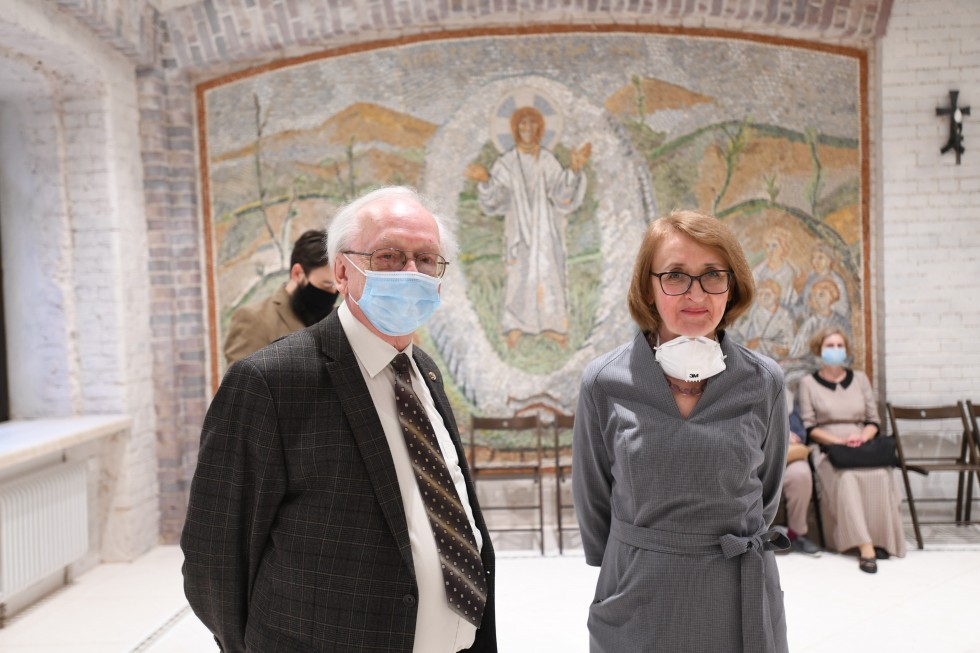
SFI Trustee, scholar Aleksey Starobinsky, and Academic Vice Rector, Larisa Musina
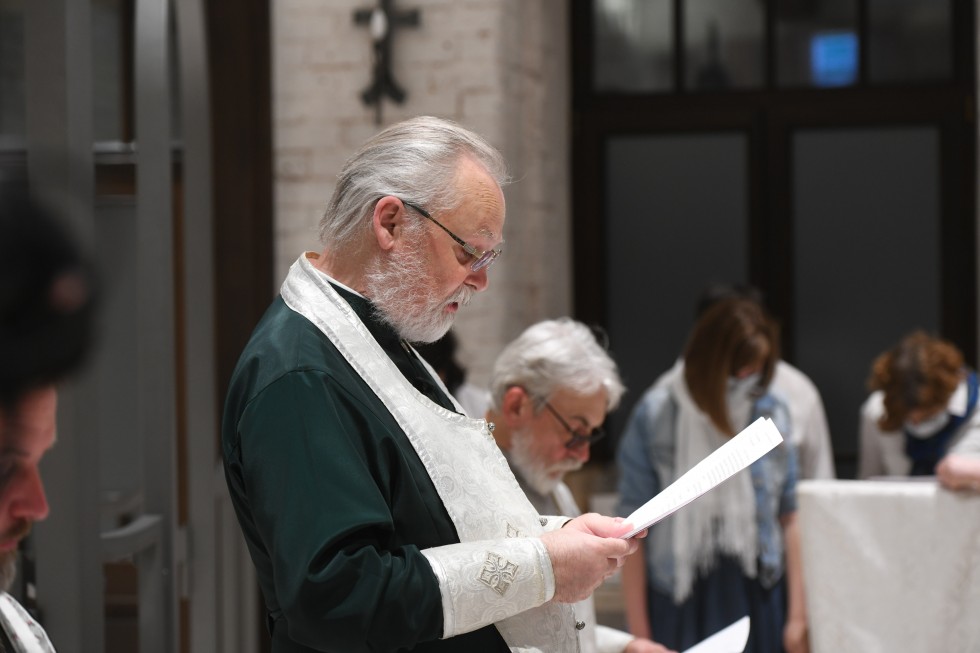
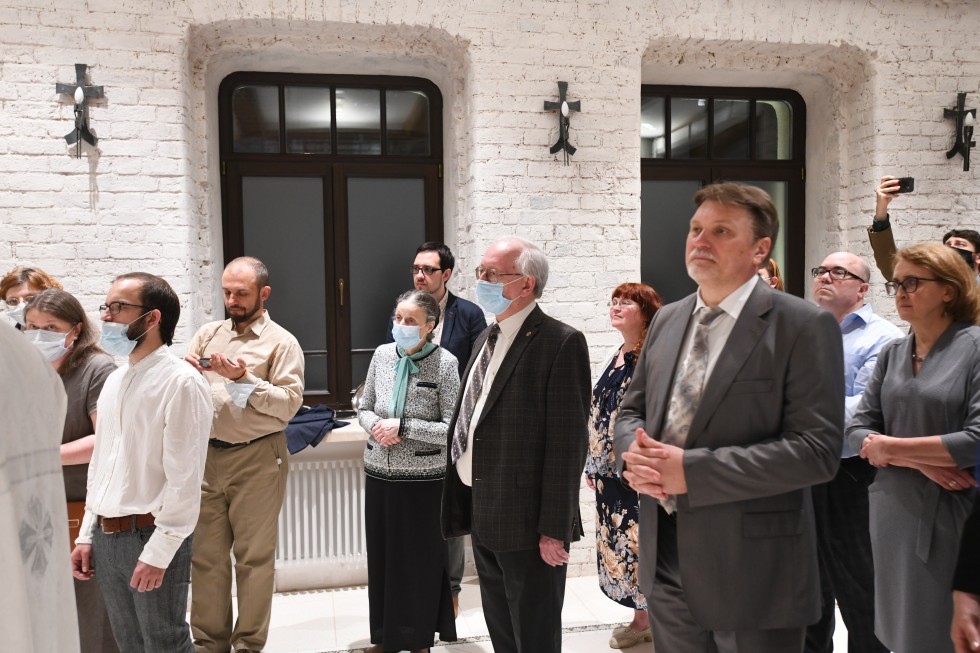
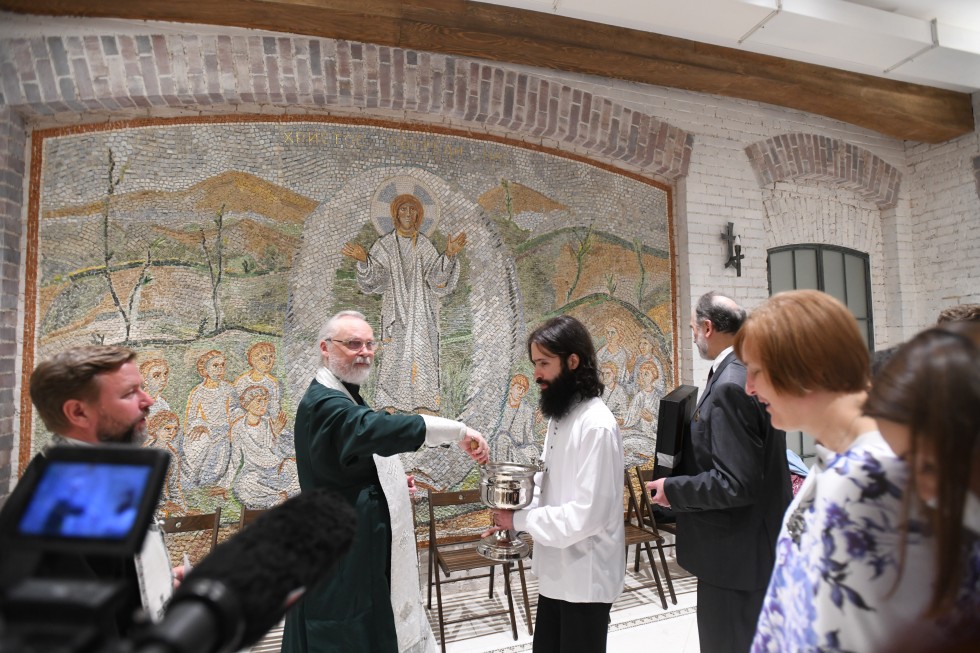
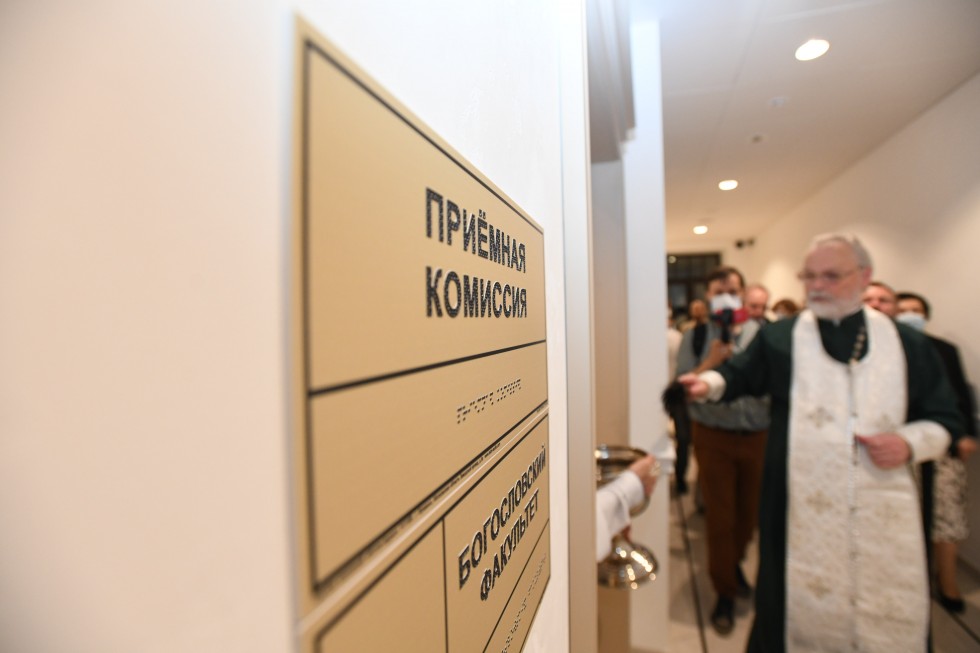
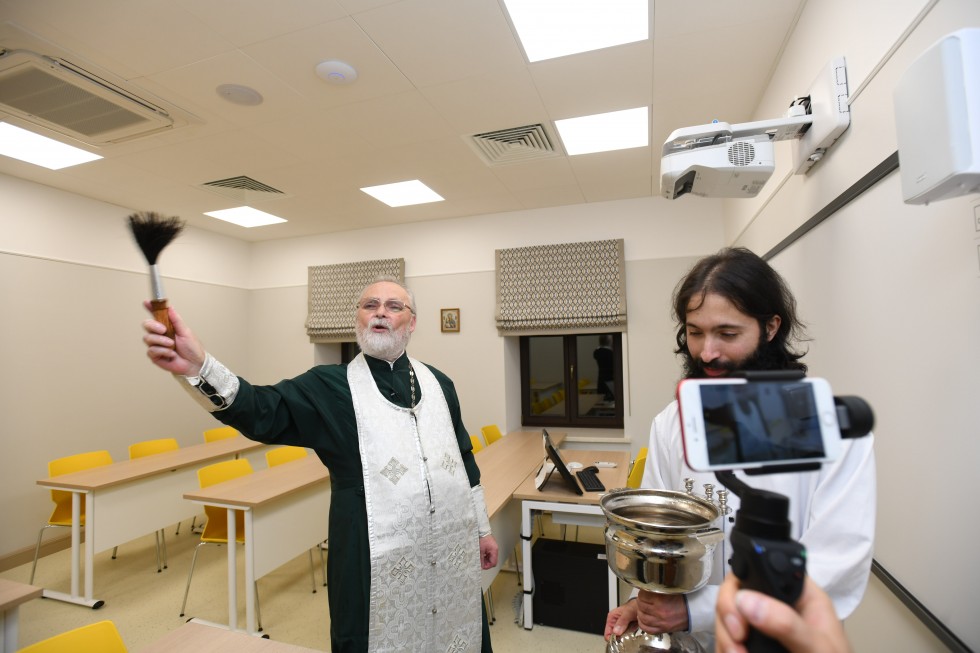
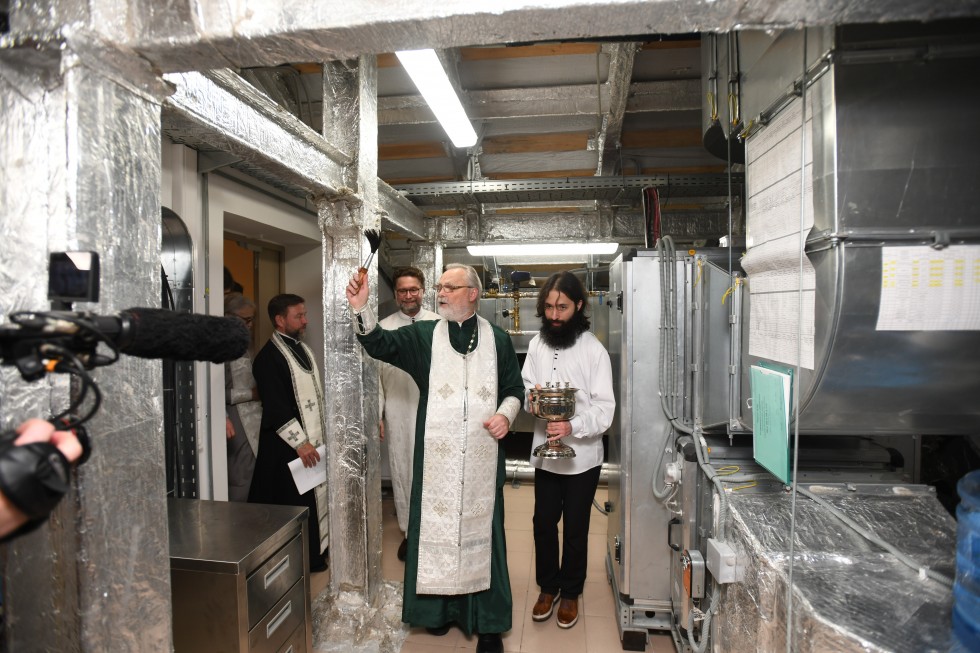
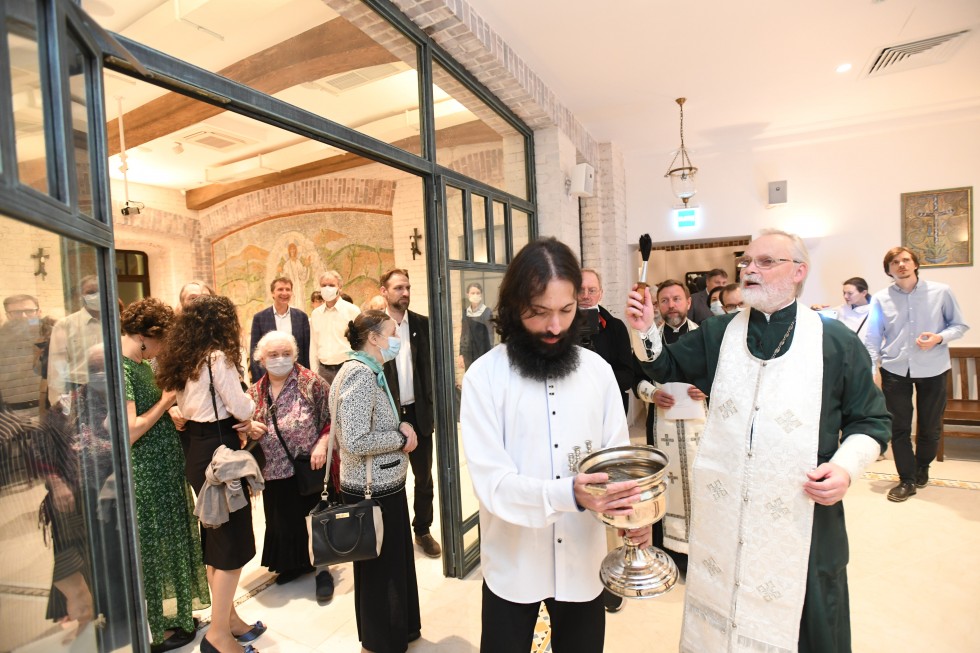
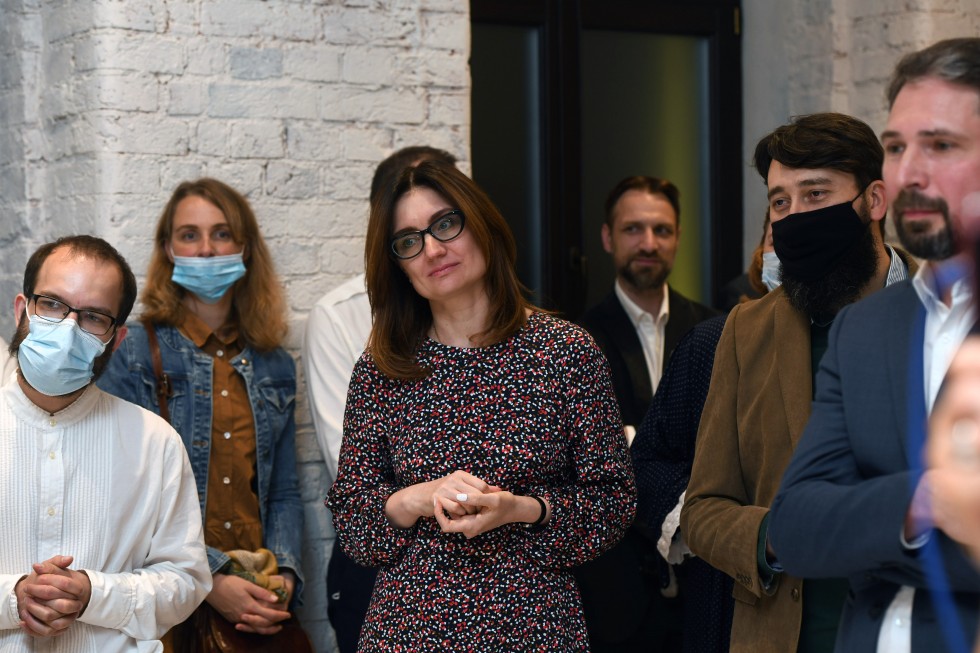
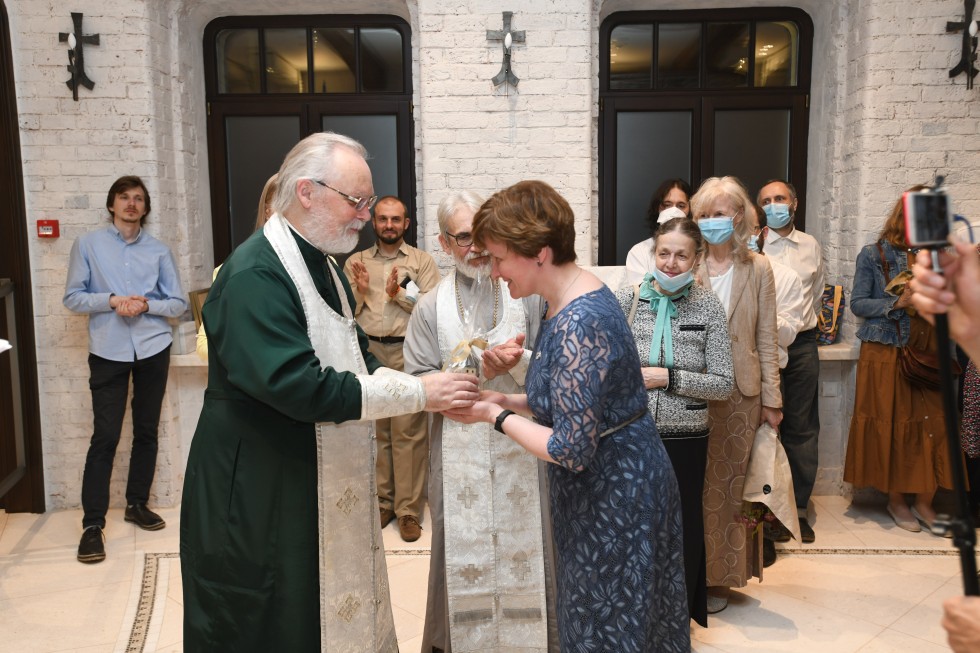
Handing out memorial gifts of thanksgiving to donors
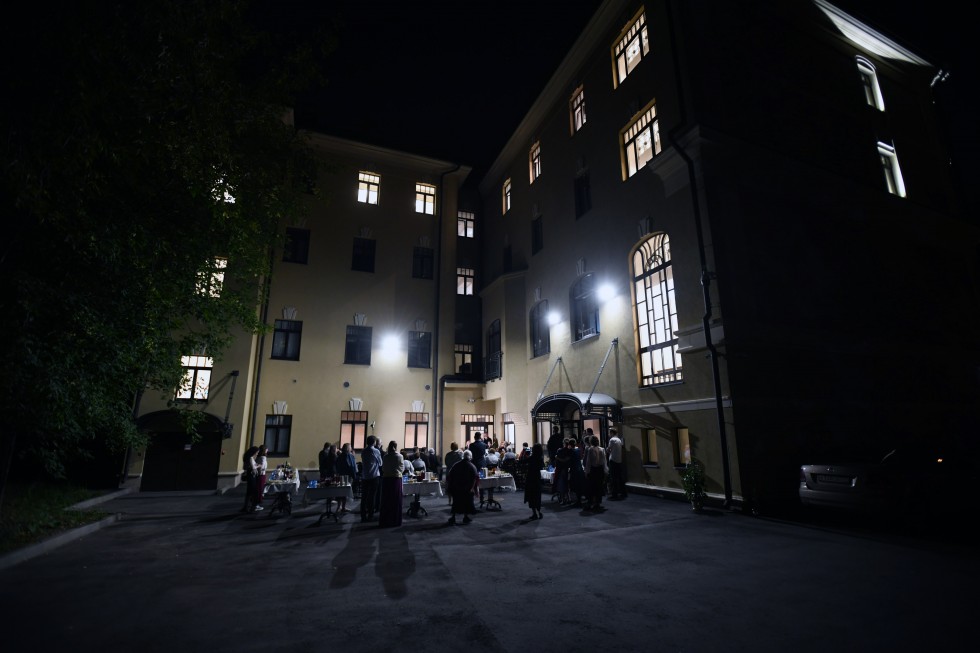
A small concert by the Caprice Quartet string quartet, which played music by Tchaikovsky, Rachmaninov and Borodin
